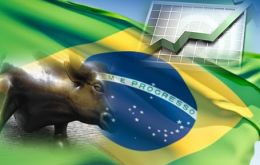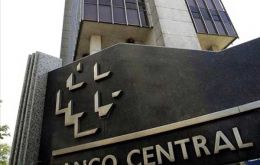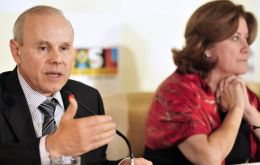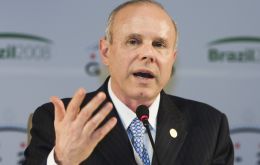MercoPress. South Atlantic News Agency
Tag: Brazil economy
-
Saturday, December 7th 2013 - 06:03 UTC
Brazil inflation slows down in November to an annualized 5.77%

Brazil's annual inflation cooled in November falling to 5.77%, reported the Institute of Geography and Statistics, IBGE, on Friday. The November reading was the lowest since registering 5.84% in December 2012.
-
Thursday, November 21st 2013 - 15:06 UTC
Brazil's unemployment drops to 5.2% in October unaffected by weak economic performance

Brazil's jobless rate fell to 5.2% in October from 5.4% the previous month, despite sluggish economic growth, official statistics released Thursday showed. In October of 2012, the rate stood at 5.3%, according to the Brazilian Institute of Geography and Statistics (IBGE). Brazil experienced record low unemployment of 4.6% last December.
-
Thursday, October 10th 2013 - 05:11 UTC
Brazil raises basic interest rate to 9.5% and leaves door open for further increases

Brazil Central bank raised interest rates for the fifth straight time on Wednesday and gave no indication of backing off its battle with high inflation. The benchmark Selic interest rate now stands at 9.5%, up fifty basic points from 9%.
-
Friday, September 27th 2013 - 21:40 UTC
Jobs market remains strong in Brazil; unemployment down to 5.3% in August

Brazil's jobless rate fell unexpectedly and salaries jumped in August from the previous month, government data showed this week. It was the second consecutive month-to-month drop in Brazil's jobless rate, which remains close to record lows.
-
Thursday, August 29th 2013 - 02:48 UTC
IMF encouragement for Brazil’s economy gradual upturn

The Brazilian economy is on a gradual upturn from the slowdown begun in mid-2011, the IMF says while urging Brasilia to continue efforts to rein in inflation. The country's 12-month inflation reached 6.27% in July, close to the upper limit of the government target of 6.5%.
-
Friday, August 16th 2013 - 03:04 UTC
Brazil's June economic activity picked up, but recovery remains fragile

Brazil's economic activity grew at a slightly slower pace than expected in June despite strong industrial output, data showed on Thursday. The central bank's IBC-Br index climbed 1.13% in June from May in seasonally adjusted terms, up from a decline of 1.50% in the previous month.
-
Friday, August 2nd 2013 - 03:33 UTC
Brazil June public accounts improve supported by state and local governments’ surpluses

Brazil's twelve-month public sector primary budget surplus widened in June amid a robust surplus from state and local governments, helping bring the country's nominal deficit slightly narrower.
-
Wednesday, July 31st 2013 - 06:00 UTC
Brazil’s next soybean crop expected to increase 9% to a record 89.1 million tons

Brazil’s 2013/14 soybean crop that starts planting in September is expected to grow by 9% under normal weather conditions to a record 89.1 million tons, local crop analyst AgRural said in a release.
-
Tuesday, July 23rd 2013 - 07:54 UTC
Despite papal blessings, Brazil further cuts spending and growth forecast

Brazil is cutting spending for the second time in two months to help meet its fiscal target as it forecasts slower growth this year which was also confirmed according to the latest Central Bank survey. The economic data was announced while Brazil had its eyes and ears in Rio do Janeiro to receive Pope Francis.
-
Saturday, July 20th 2013 - 05:35 UTC
Fitch maintains Brazil’s debt outlook ‘stable’ and minister says the report was ‘fair’

Brazilian Finance Minister Guido Mantega said that Fitch's decision to maintain the country’s debt outlook at stable was “fair” given Brazil robust finances and lesser debt burden.
